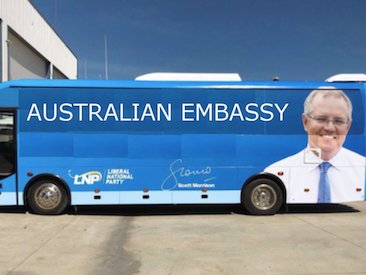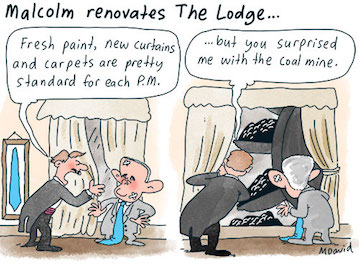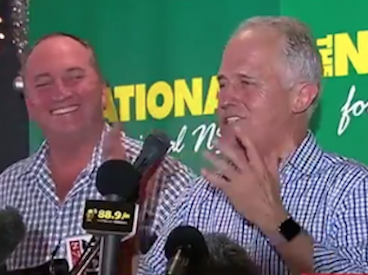The Abbott Government has called for a national conversation on citizenship, but in fact this is just a smokescreen to help entrench inequality into our system. Law lecturer Ingrid Matthews explains.
Most Australians would have heard by now that our Federal Government has called for a national conversation on citizenship. This phony act of dialogue with the people is accompanied by all sorts of fanfare — flag-saturated press conferences, media releases, terror-mongering rhetoric, cabinet discussion leaks, and a discussion paper that pre-empts the results of the "conversation".
The Government wants to – and will – radically change the extent of executive power over basic citizenship rights, including citizenship itself.
This story is over six months old, but the mainstream media are reporting each announcement and comment as news. For lack of space as well as of will, the mainstream media coverage lacks context. So-called balanced reporting includes verbatim, uncritical reproduction of Government claims, even when the claims are misleading; are deliberate obfuscation; or include outright lies, including to parliament. What follows, therefore, attempts to cover some of the arguments, facts, and historical details that might assist concerned Australian citizens to hold up our end of the conversation.
At present, Australian citizenship is Australian citizenship, whether conferred by the state or inherited by birth. The government is proposing different classes of Australian citizen. Some might argue that this in itself is unAustralian. On closer inspection, however, the changes would entrench classification of citizenship along migration lines; which is very Australian indeed, if we understand Australian in terms of the dominant culture since 1788.
According to a now infamous leak to Fairfax, Abbott and Minister for Immigration and Border Protection Peter Dutton argued for legal power to "strip" citizenship rights not of some Australians, but of all Australians, irrespective of conferral or birth status. Weird as it sounds, this would in fact be more consistent with principles of equality. Attack all of us or none of us; surely that is the egalitarian Australian way?
Drip drip drip #auspol Leaked briefing paper shows divisions in Abbott cabinet over cancelling citizenship http://t.co/PSihCLkwcC via @smh
— ComradeTroublemaker (@MinhKular) June 15, 2015
Others, including Foreign Minister Julie Bishop, Education Minister Christopher Pyne and Communications Minister Malcolm Turnbull, raised the obvious point that the policy would breach international law (United Nations Convention on the Reduction of Statelessness, 1961). They defend a position of only attacking certain migrants’ rights. This was perceived and reported as the more moderate view. It is not moderate. It is an abomination. Either you are Australian or you are not.
All the options are terrible and there is no rational justification for any of it. Nevertheless, we are stuck with this appalling Government proposal and the government has the power to pass it into law, so it has to be taken seriously.
The top class of citizen the most secure and most privileged, would remain white Australians whose parents and grandparents were born in Australia or the United Kingdom. I am in this category and I can categorically state that many in my lucky demographic are entertaining the idea of two-tiered citizenship.
The line goes like this: oh, I can understand revoking the citizenship of terrorists.
This attitude is based on a false premise. The Government is not proposing to remove citizenship rights from terrorists but from terror suspects. Alleged terrorists are not terrorists, even if Prime Minister Tony Abbott refuses to differentiate between the two, regularly calling suspects "terrorists" (including a teenager killed by police).
It is an ugly reality that the bulk of those of us whose citizenship is not at risk – of being suspended, cancelled or revoked in whole or in part by the state – are comfortable with others’ citizenship rights being taken by the Government in the name of national security. This reveals an even uglier reality — national security is not for all Australians. It is for those who are already secure.
The next class is citizens whose parents were born overseas. These people potentially hold dual citizenship. They have access, in theory, to citizenship elsewhere and thus would not necessarily be rendered stateless by us. It was reported that Foreign Minister Julie Bishop argued against this on the basis that the other country would not accept a citizenship application from a person Australia has decided is a terror suspect.
The one who started all this, Social Services Minister Scott Morrison, the former immigration minister, made an alternate case. Morrison seeks the power to suspend some rights of all citizens, rather than the rights of some citizens. He likens this to "the right to vote if you are in prison or something like that".
Scotty's brilliant idea!....Clayton's Citizens. The Oz citizenship you have when you don't have Oz citizenship http://t.co/TOvttdE3DW
— Coalition Tea Lady (@ItsBouquet) June 1, 2015
Morrison implies that all prisoners are barred from voting. In fact, when former conservative Prime Minister John Howard drafted this measure into statute in 2006, it was struck down by the High Court of Australia for being unconstitutional. The compromise position was to bar prisoners serving a sentence longer than three years from voting. Prisoners retain the right to re-enrol on release, which is a different question from how many actually do. In other words, Morrison’s claim is false and if it was true it would be unconstitutional. This is not misspeaking, or human error, but a lie — a hallmark of our current administration.
Morrison is a key player here. He was the key architect of Operation Sovereign Borders — the hideous militarisation of refugee policy that sees Australia persecuting people who are fleeing persecution. Morrison was the responsible minister when the Australian Citizenship Amendment Bill 2014 foreshadowed most of these changes last year (Hansard, 23 October p11744; see here for an analysis of the second reading speech for that bill). The Senate referred the bill to the Constitutional and Legal Affairs Committee on 30 October 2014.
Furthermore, Senator Concetta Fiaverentti-Wells, parliamentary secretary to Morrison, has been appointed by the prime minister to "lead the national conversation" on citizenship (more on this development below).
The final category is actual dual citizens. For this group, regardless of where they or their parents or grandparents or spouses were born, the Government is unequivocally seeking the power to suspend or revoke the Australian half of their dual citizenship. The grounds for such revocation would be this: the Minister for Immigration and Border Protection forms the view that the Australian person is a terror suspect.
This is also an area where the LNP has form. When former Immigration Minister Kevin Andrews (now Defence Minister) formed a view on character grounds about Dr Muhamed Haneef, it turned out extremely badly for the LNP Government and the Australian taxpayer. Off to indefinite detention for Dr Haneef to keep, according to the minister, Australians safe. It cost us millions of dollars in legal processes and, ultimately, in damages. Millions — for nothing but a shameful exercise in terror-mongering. Think how many public housing units that could have built, or respite care hours it could have provided.
In effect, despite the nature of rights being necessarily universal – in moral and democratic principle, and as codified into international law by the International Covenant on Civil and Political Rights (1976) – our government wants us to choose between the following two options:
- expand executive power to suspend, cancel or revoke basic rights over all Australian citizens, in breach of inter alia doctrine of separation of powers, presumption of innocence, and international law; or
- expand executive power over some Australians but not others, effectively creating a two-tiered citizenship regime where more recent migrants have fewer rights, in breach inter alia of the rule of law and the Universal Declaration of Human Rights.
Asserting breach of such fundamental principles is a serious matter, so it is worth setting out a few brief definitions.
Executive power: the exercise of power, in this case over the most fundamental of rights, by the minister, at his discretion, based on a view he has formed.
Separation of powers: The power-sharing arrangement by which democracies establish ‘checks and balances’ to limit the power of the legislature (both houses of the Parliament), the executive (Ministers in cabinet and the staff of their departments, such as immigration officials) and the judiciary (the High Court can strike down unconstitutional laws, that is, law that is enacted without the constitutional authority to do so).
Presumption of innocence: Every person accused by the state of breaching our criminal law is innocent until proven guilty beyond reasonable doubt, as decided by a judge or jury of their peers, in a properly constituted court of law.
Rule of law: Everyone is equal before the law and no person is above the law.
Universal Declaration of Human Rights: All humans are born equal in rights and dignity… (Article 1).
What is the national conversation about? National security, citizenship and reporting
As is the way with a deeply fragmented media, the Government positions tend to be presented in an ahistoric and decontextualized way. For example, look at who is saying no, stop. None of this should be entertained. It is an abomination. Wherever that discourse appears, it is under attack from Government.
Reporters then place the aggressive and irrational Government response to the fore, because it is the Government speaking, while the rational, informed observations of human rights professionals fades to the end of the story. This is called "balance". Either way, Government is not interested in a national conversation at all. If it was, as esteemed a person as Gillian Triggs, in her capacity as president of the Australian Human Rights Commission, would be welcomed rather than vilified.
Gillian Triggs and Bronwyn Bishop in a stand-off on Q&A http://t.co/QfC6BrPKjj #qanda #auspol pic.twitter.com/lKugtvwtuK
— Federal Politics (@PoliticsFairfax) June 15, 2015
As mentioned, another problem is that of presenting the dual citizen option as somehow more palatable. This narrative necessarily implies that the Government should not attack all Australians’ citizenship rights, but attacking some citizens might be okay. The dominant narrative thus leans toward an option that disregards equality as a fundamental value. It is not surprising that this option is gaining the most traction. Entrenched inequality on the basis of migration status is as old as white Australia itself, but has become particularly poisonous under the current government.
Another narrative is that our citizenship rights have been set in stone since the dawn of the nation-state. This is not true. It took almost 50 years after Federation before the Australian Citizenship Act 1948 (Cth) was passed (more on its history and context below). Malcolm Turnbull referred to the 1948 Act, putting the conservative position that "an old law is a good law". His claim ignores that the previous conservative government of John Howard, in which he was a minister, amended the Act in 2007.
Another "balance" assumption is that it is achieved by presenting the three options outlined above and then ask whether the other major party will agree to, or oppose, the policy. This is nonsense. The relevant information is available in the discussion paper, the citizenship amendment bill, the media releases and press conferences and reports and rhetoric.
The real conversation is happening online, which the mainstream media routinely dismiss as a "Twitter storm" or "social media outrage". In the social media sphere, the question of ‘What will Labor do?’ looms large, but remains largely irrelevant. Labor will not be wedged on national security — that's what Labor will do. This is understandable, given the structural racism of the Australian polity and the intense fanning of racist flames by the current Government. Still, it is a weak and cowardly position to take. We were just as racist in 2007, when Rudd placed the Apology to the Stolen Generations on his election platform.
Either way, Labor is not in power and when they are, terror-mongering is less rampant. Coalition terror-mongering is the problem. It is the Government that has the power to pass these proposals into law, so however much we may want to, we cannot dismiss these ideas as loony nonsense.
There is more, much more (extended analysis, here). But for this article, I limit myself to one more key point: there is something peculiarly Freudian about Abbott attacking the citizenship rights of (more recent) migrant Australians. Again, history and context can assist.
Abbott:We will introduce into parliament strong new laws to strip citizenship from terrorists who are dual nationals http://t.co/i70YP6XCFl
— Sky News Australia (@SkyNewsAust) June 15, 2015
The Australian Citizenship Act 1948 (Commonwealth) was passed by the government of Labor hero Ben Chifley and came into force on 26 January 1949. Until then, Australians were British subjects.
Like colonisation (terra nullius), and the Australian Constitution itself (s. 51 xxvi), these legal developments were deeply pre-occupied with race. The assertion of white superiority and thus a fixed racist mindset were key drivers in the formation of the Australian nation state, as evidenced by the debate at the time and the race power, above. Section 51 defines the federation itself, because it lists which powers were transferred from the former colonies to the Commonwealth, rather than be retained by the new states. State-sanctioned racism, as authorised by the Constitution, has been upheld by the High Court of Australia.
A central concern of the establishment of Australian citizenship was the influx of post-war migrants — and particularly southern and eastern European migrants. We were not so concerned – and never have been – by British migrants. In fact, Britain was only declared a foreign power at law by the High Court in Sue vs Hill [1999] HCA 30. The case challenged the constitutionality of dual citizens sitting as elected members of the Commonwealth parliament. This is somewhat ironic, because no-one seems privy to the date on which Tony Abbott renounced his British citizenship.
While this may sound like a snide aside, there are serious underlying points.
Malcolm Turnbull has asserted that the current arrangements are "an old law and a good law". This is demonstrably false. In fact, the arrangements favour Britain and British migrants and inequality is not good, for the reasons set out above. The declaration of Britain as a foreign power is in living memory for anyone born before 1985 or thereabouts; and 1999 is not 1948; and sixteen years is not "old".
Secondly, Abbott’s allegiance to Britain is abundantly evident. His aggressive and divisive campaign during our Republic referendum; and his reference to pre-1788 Australia as "nothing but bush" are but two examples.
When will Abbott stop lying and come clean with his citizenship? https://t.co/Ccyb7COCDu #auspol #ukpol #uspol Tony Abbott is a British!
— Betty T (@BetterOZ2) June 7, 2015
This is not to say that Abbott can not also show allegiance to Australia. But in the current context, he has also proffered "Britain does it" as a substantive argument for the "strip citizenship" provisions he wants to introduce here. This is irrelevant. Britain is a former colonial power — of Australia but also in the Middle East. Britain has many more migrants from the Middle East than we do. Britain is next door to France, which also experiences periodic outbreaks of Islamophobia against its Algerian-French population, also a legacy of colonialism. Britain is in the same hemisphere as – and not buffeted by the largest ocean on earth from – Iraq and Syria.
In summary, our geopolitical realities are enormously different to Britain and always have been, yet Abbott does not see it that way because he is British-born and, in many ways, remains British at heart — if not in fact.
Something as fundamental as violating basic citizenship rights cannot be properly debated and should not be presented to the people without context and history. Given the problems with the proposed laws and the mainstream coverage, academia and independent media – the citizen scholar and the citizen journalist – must step up.
You can follow Ingrid Matthews on Twitter @Imusing.
Well who'd a thunk it. The racist Australian polity wants second class citizenship based on migration status https://t.co/xKerqUK9Vy
— Ingrid Matthews (@iMusing) June 14, 2015

This work is licensed under a Creative Commons Attribution-NonCommercial-NoDerivs 3.0 Australia License
Monthly Donation
Single Donation
Gillian Triggs brings stripping citizenship back to a breach of principles of #MagnaCarta Bishop disagrees #QandA http://t.co/OmxVnHjGA1
— ABC Q&A (@QandA) June 15, 2015
Informed citizen journalism for informed citizens. Subscribe to IA for just $5.









